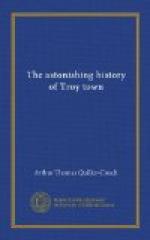On the first day you take a boat and row about the harbour. “Scenery!” you exclaim, “why, what could you have more? Here is a lovely harbour flanked by bold hills to right and left; here are the ruined castles, witnesses of the great days when Troy sent ships to carry the English army to Agincourt; here axe grey houses huddled at the water’s edge, hoary, battered walls and quay-doors coated with ooze and green weed. Such is Troy, and on the further shore quaint Penpoodle faces it, where a silver creek, dividing, runs up to Lanbeg; further up, the harbour melts into a river where the old ferry-boat plies to and from the foot of a tiny village straggling up the hill; further yet, and the jetties mingle with the steep woods beside the roads, where the vessels lie thickest; ships of all builds and of all nations, from the trim Canadian timber-ship to the corpulent Billy-boy. Why, the very heart of the picturesque is here. What more can you want?”
On the second day you will see all this from the harbour again, or perhaps you will cross the ferry and climb the King’s Walk on the opposite bank; you will see it all, but with a change. It is more lovely, but not the same.
On the third day you will cast about in your mind to explain this; and so in time you will come to find that it is the spirit of Troy that plays this trick upon you. For you will have learnt to love the place, and love, as you know, dear sir or madam, is apt to affect the eyesight.
The eyes of Mr. Fogo, as Caleb pulled sturdily up with the tide, were passing through the first of these stages.
“This,” he said at length, reflectively, “is one of the loveliest spots I have looked upon.”
Caleb, in whom humanity and Trojanity were nicely compounded, flushed a bright copper-colour with pleasure.
“’Tes reckoned a tidy spot,” he answered modestly, “by them as cares for voos an’ such-like.”
“There, now,” he went on, after a pause, and turning round, “yonder’s Kit’s House, wi’ Kit’s Cottage, next door. You can’t see the house so plain, ’cos ’tes behind the trees. But there ’tes, right enough.”
“Is the cottage uninhabited, too?”
“Both on ’em. Ha’nted they do say. By the way, I niver axed ’ee whether you minded ghostes?”
“Ghosts?”
“Iss, ghostes. This ’ere place was a Lazarus one time, where they kept leppards.”
“Leopards? How very singular!” murmured Mr. Fogo.
“Ay, leppards as white as snow, as the sayin’ goes.”
“Oh, I see,” said Mr. Fogo, suddenly enlightened. “You mean that this was a Lazar-house.”
“That’s so—a Lazarus. The leppards used to live there together, and when they died, they was berried at dead o’ night down at thicky spit you sees yonder. No one had dealin’s wi’ ’em nor went nigh ’em, ’cept that they was allowed to make ropes. ‘Tesn’ so many years that the rope-walk was moved down to th’ harbour mouth.”




